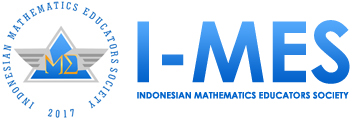Bagaimana Respon Siswa terhadap E-Modul Matematika dengan Konteks Budaya Sumatera Selatan?
DOI:
https://doi.org/10.35706/sjme.v8i1.10787Abstract
This research explores the utilization of an e-module with the context of local wisdom from South Sumatra in mathematics education at the junior high school level. Involving ninth-grade students from four different schools in South Sumatra, the study aims to evaluate students' responses to the e-module. The research methodology includes One-to-one and small group stages, focusing on clarity, user-friendliness, and students' interest in the e-module content. The findings indicate that students responded positively to the e-module, expressing high enthusiasm for multimedia features such as images, videos, and interactive exercises. The diversity of multimedia elements aids in visually and contextually explaining mathematical concepts, making learning more engaging. The flexibility of the e-module allows students to learn independently anywhere and anytime, overcoming constraints of space and time in traditional learning settings. The integration of local wisdom is recognized as an added value, providing students with additional insights into the culture of South Sumatra. So it can be concluded that the use of e-modules in the context of local wisdom from South Sumatra has a positive impact on mathematics learning at junior high school level.
Downloads
References
Adon, M. (2022). Menggali Konsep Filosofis Mbaru Gendang Sebagai Simbol Identitas Dan Pusat Kebudayaan Masyarakat Manggarai, FLORES-NTT. Jurnal Masyarakat Dan Budaya, 24(2).
Amerstorfer, C. M., & Freiin von Münster-Kistner, C. (2021). Student perceptions of academic engagement and student-teacher relationships in problem-based learning. Frontiers in Psychology, 12, 4978.
Andriani, S., Ramadhona, R., & Tambunan, L. R. (2020). Pengembangan E-modul interaktif berbantuan software sigil pada materi geometri dengan permasalahan kontekstual kelas XI SMK. Student Online Journal (SOJ) UMRAH-Keguruan Dan Ilmu Pendidikan, 1(2), 692–700.
Ardianti, S. D., Wanabuliandari, S., & Tanghal, A. B. (2023). Implementation the Ethnoscience-Based Smart Module to Improve Students’ Patriotism Character. Jurnal Pendidikan IPA Indonesia, 12(2).
Bada, J. K., Asianzu, E., Lugemwa, B., Namataba, J., & Milburga, A. (2020). An Empirical Study on E-Learning Uptake by Teaching Staff at Makerere University Business School. International Journal of Education and Development Using Information and Communication Technology, 16(2), 188–206.
Bikoir, T., Astuti, I., & Suratman, D. (2022). Analysis Of E-Module Design Development Needs on Grade Vi Elementary School Math Learning. Jurnal Scientia, 10(2), 323–331.
Charmila, N., Zulkardi, Z., & Darmawijoyo, D. (2016). Pengembangan soal matematika model PISA menggunakan Konteks Jambi. Jurnal Penelitian Dan Evaluasi Pendidikan, 20(2), 198–207.
Dewi, P. D. P., & Suniasih, N. W. (2022). Media Video Pembelajaran Matematika Berbasis Etnomatematika pada Muatan Materi Pengenalan Bangun Datar. Jurnal EDUTECH Undiksha, 10(1), 156–166.
Dwivedi, Y. K., Hughes, L., Ismagilova, E., Aarts, G., Coombs, C., Crick, T., Duan, Y., Dwivedi, R., Edwards, J., & Eirug, A. (2021). Artificial Intelligence (AI): Multidisciplinary perspectives on emerging challenges, opportunities, and agenda for research, practice and policy. International Journal of Information Management, 57, 101994.
Gikas, J., & Grant, M. M. (2013). Mobile computing devices in higher education: Student perspectives on learning with cellphones, smartphones & social media. The Internet and Higher Education, 19, 18–26.
Gyimah, N. (2022). Assessing technological innovation on education in the world of coronavirus (COVID-19). Annal Immunology & Immunotherapy, 4(1), 158.
Hutagalung, T., Adisaputera, A., & Akbar, S. (2022). Development of Flipbook Maker-Based E-Modules in Prose, Poetry, and Drama Teaching Courses in the Indonesian Language and Literature Education Study Program FBS Unimed. International Journal of Early Childhood Special Education, 14(3).
Istiningsih, S., & Heri, S. (2022). Pengembangan Media Pembelajaran Berbasis Kearifan Lokal Permainan Mpa’a Gopa Untuk Keterampilan Berbahasa Indonesia Siswa Kelas IV Tahun Ajaran 20121/2022. Jurnal Ilmiah Mandala Education, 8(1).
Kristina, H., Vitasari, M., & Taufik, A. N. (2022). Pengembangan E-modul Berbasis Literasi Sains Tema Ayo Siaga Bencana untuk Melatih Kemandirian Belajar Siswa SMP. PENDIPA Journal of Science Education, 6(3), 754–763.
Laurens, T. (2018). The Effectiveness of Local Wisdom Based-Realistic Mathematics Learning to Improve Learners’ Characters at State Elementary Schools in Ambon City. First Indonesian Communication Forum of Teacher Training and Education Faculty Leaders International Conference on Education 2017 (ICE 2017), 611–615.
Nabayra, J. N. (2020). Video-Based E-Module for Mathematics in Nature and Students’ Learning Experiences in a Flipped Classroom. Journal of Science & Mathematics Education in Southeast Asia, 43.
Nugraha, G. N. S., Tegeh, I. M., & Sudarma, I. K. (2019). Pengembangan Multimedia Interaktif Matematika Berorientasi Kearifan Lokal Kelas 3 Sekolah Dasar Negeri 1 Paket Agung. Jurnal Edutech Undiksha, 7(1), 12–22.
Nuraini, L. (2022). Integrasi nilai kearifan lokal dalam pembelajaran matematika sd/mi kurikulum 2013. Jurnal Pendidikan Matematika (Kudus), 1(2).
Oktafiani, D., Nulhakim, L., & Alamsyah, T. P. (2020). Pengembangan media pembelajaran IPA berbasis multimedia interaktif menggunakan Adobe Flash pada Kelas IV. Mimbar PGSD Undiksha, 8(3), 527–540.
Oktavianti, I., & Ratnasari, Y. (2018). Etnopedagogi dalam pembelajaran di sekolah dasar melalui media berbasis kearifan lokal. Refleksi Edukatika: Jurnal Ilmiah Kependidikan, 8(2).
Pramana, M. W. A., Jampel, I. N., & Pudjawan, K. (2020). Meningkatkan hasil belajar biologi melalui e-modul berbasis problem based learning. Jurnal Edutech Undiksha, 8(2), 17–32.
Putri, L. S., Setiani, Y., & Santosa, C. A. H. F. (2023). E-Modul Matematika Berbasis Problem Based Learning Bermuatan Pengetahuan Budaya Lokal untuk Meningkatkan Kemampuan Pemecahan Masalah. Jurnal Educatio FKIP UNMA, 9(2), 880–890.
Rahmayani, M., & Asrizal, A. (2023). Enhancing Student’s Skills: Need Analysis To Develop E-Modul Integrated Problem-Based Learning Model On Smartphone-Based. Physics Learning and Education, 1(2), 81–90.
Ramawangsa, P. A., & Prihatiningrum, A. (2022). Penggunaan Digital Virtual Design dalam Mengenalkan Kearifan Lokal Konstruksi Hunian Vernakular Suku Rejang. JCES (Journal of Character Education Society), 5(2), 501–511.
Rofi’i, M., Iswari, R. S., & Indriyanti, D. R. (2022). Development of E-Module Ethnobotany Based on Lombok Local Wisdom to Improve Student Motivation and Learning Outcomes in High School. Journal of Innovative Science Education, 11(3), 362–372.
Rosa, S., Olivia, I., Gayatri, S., Fitria, T. N., & Rojabi, A. R. (2021). Increasing Youth Awareness of Local Culture Through Active Learning. Cypriot Journal of Educational Sciences, 16(4), 1582–1601.
Sanova, A., Bakar, A., Afrida, A., Kurniawan, D. A., & Aldila, F. T. (2022). Digital Literacy on the Use of E-Module Towards Students’ Self-Directed Learning on Learning Process and Outcomes Evaluation Cources. JPI (Jurnal Pendidikan Indonesia), 11(1), 154–164.
Tessmer, M. (2013). Planning and conducting formative evaluations. Routledge.
Umbara, U. (2021). Realistic Mathematics Education in Traditional Community Culture. European Online Journal of Natural and Social Sciences, 10(1), pp-93.
Untu, Z. (2022). Development of an Ethnomathematics-Based e-Module to Improve Students’ Metacognitive Ability in 3D Geometry Topic. IJIM, 16(03), 33.
Wong, C. H. S., Tsang, K. C. K., & Chiu, W.-K. (2021). Using augmented reality as a powerful and innovative technology to increase enthusiasm and enhance student learning in higher education chemistry courses. Journal of Chemical Education, 98(11), 3476–3485.
Woodcock, B., Middleton, A., & Nortcliffe, A. (2012). Considering the Smartphone Learner: an investigation into student interest in the use of personal technology to enhance their learning. Student Engagement and Experience Journal, 1(1), 1–15.
Yuliana, Y., Fathurohman, A., & Siahaan, S. M. (2023). Analysis of Needs for the Development of Local Wisdom-Based Junior High School Science E-Modules Related to Ethnoscience in South Sumatera. Jurnal Penelitian Pendidikan IPA, 9(10), 7865–7870.
Downloads
Published
How to Cite
Issue
Section
License

This work is licensed under a Creative Commons Attribution-ShareAlike 4.0 International License.
Authors who publish with this journal agree to the following terms:
- Authors retain copyright and grant the journal right of first publication with the work simultaneously licensed under a Creative Commons Attribution License that allows others to share the work with an acknowledgment of the work's authorship and initial publication in this journal.
- Authors are able to enter into separate, additional contractual arrangements for the non-exclusive distribution of the journal's published version of the work (e.g., post it to an institutional repository or publish it in a book), with an acknowledgment of its initial publication in this journal.
- Authors are permitted and encouraged to post their work online (e.g., in institutional repositories or on their website) prior to and during the submission process, as it can lead to productive exchanges, as well as earlier and greater citation of published work (See The Effect of Open Access).










